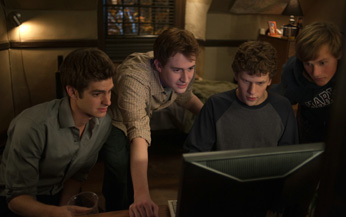Top 10 Film Industry Stories of 2010: #9
People 'Like' The Social Network
By David Mumpower
January 27, 2011
By now, most of you are aware of the story that one of Zuckerberg’s Facebook likes was The West Wing. Once he found out about the context given to him by The Social Network, he removed that from his page…but not all pages, of course, which is something Zuckerberg has the power to do. This is what makes his entire story so captivating. We are talking about someone who isn’t much older than several of our readers and in fact significantly younger than others. He is the very definition of a boy king, and the movie explores this absorbing rise to power of someone largely lacking personality. In fact, Zuckerberg is largely revealed to be lacking in every way except computer savvy.
As portrayed by Jesse Eisenberg, Zuckerberg does not have a belief system. The Facebook founder does not demonstrate loyalty to anyone, and he does not exhibit honesty. He is amoral and unfocused save in two regards. The first is that he is a desperate social opportunist. The other is that he wants to build a Web site that compares women to farm animals. Then, that gets changed to comparing Harvard co-eds to other Harvard co-eds from other dorms. After his drunken misogyny shuts down the entire university network backbone overnight, Zuckerberg is then given an idea to make a Web site that is someone else’s idea, in this case twins. Once faced with that creative outlet, he evolves the idea into something uniquely his own but not before finding inspiration from a lonely, horny friend who simply wants to know someone’s relationship status. As shown in The Social Network, the genesis of Facebook is an amalgam of ideas from other people that Zuckerberg claimed as his own then made into his own. In a way, he is Ayn Rand’s dream character yet he seems to bumble his way through without ever making a specific decision. The juxtaposition is breathtaking.
This lack of specificity, this exploration of ethos and nihilism has become one of the most gripping of our era. I would also argue that because The Social Network takes no sides, instead displaying all of the available stories without passing judgment, the film will prove to be timeless in the same way that its most frequently mentioned comparison, Citizen Kane, achieved in 1941. And I say this as someone who hasn’t even decided how much I like the movie.
There is so little warmth on display in The Social Network that I feel the wind chill drop every time I watch it. That may make me admire it more. Or less. I cannot decide. I am not sure Sorkin and director David Fincher could, either, which is why they found it just as all-consuming. Rather than championing any particular point of view, Fincher simply reveals what he knows of the story as diligently researched by Sorkin and Mezrich. In the end, what they discover is a bunch of oversexed college kids dealing with business ethics the likes of which are ordinarily reserved for decades old companies. Such is the nature of the rapidly evolving Internet that even its triumphant start-up companies are mired in confusion about who created what. There is no finality to any of it just as there is no real finality to The Social Network. Did Zuckerberg betray his only friend? Did he frame his next business ally? Is all of this suspicion an unfair aspersion against his character?
In terms of movie production triumphs, The Social Network is in rare company. The modest $40 million production has earned $95.5 million domestically and roughly $210 million worldwide. It has won several major end-of-year awards for acting, writing, and direction. It has been selected the best picture by over a dozen North American film critics associations including a Golden Globe for Best Motion Picture (Drama). With eight Academy Awards nominations, it is well positioned to dominate the major categories. A movie with no protagonist, no antagonist, and no tangible conflict has somehow become a blockbuster movie with an impeccable awards season pedigree.
What is The Social Network?
We may spend decades debating this issue. Alternately, Facebook may flame out just as quickly as web enterprises such as AOL and MySpace have, causing the movie debates to cease due to disinterest. Nobody knows. All we can say with certainty is that viewers have pressed the Like button for the Social Network. Facebook even allows us to track how popular the Facebook movie is. As I type this, the current total is over 800,000.
Continued:
1
2




